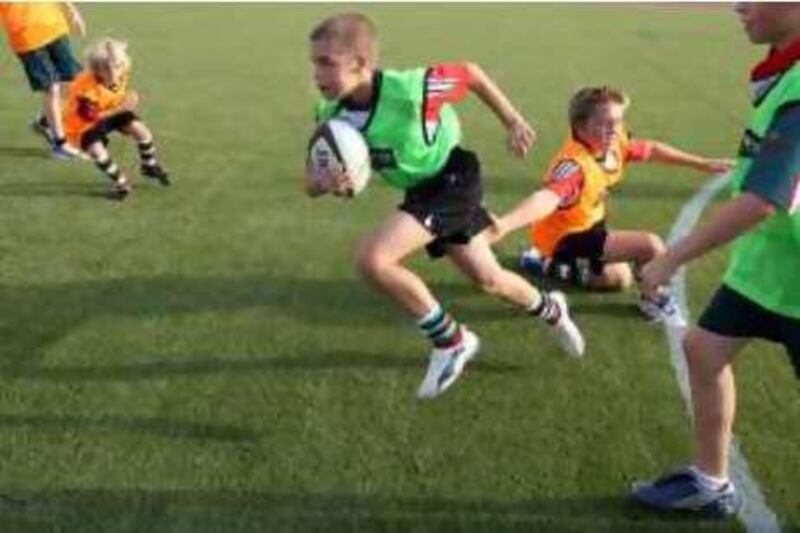Headmasters should offer more extra-curricular activities, according to the Minister of Education, a move that may address a glaring disparity between private and state schools. Dr Hanif Hassan said such activities would allow pupils to build their personalities and interpersonal skills. Private school pupils are offered many activities, such as football, ballet, swimming and debating, while most government schools have no after-school programmes. Research has shown that such activities can improve classroom performance, enhance pupils' social skills and make them fitter. Ahmad Abdul Rahman, the ministry's director of student activities, said it would "take time" to develop the kinds of programmes available to pupils in private schools. Money for such programmes is limited at the moment. The education budget, which is split between higher education and schools, is set at Dh9.7 billion (US$2.6bn), the same as last year. If an after-school programme were to succeed, more staff would have to be employed and, in some cases, new sport facilities built. Money for that would have to come from operating budgets, which are so stretched some state schools lack even libraries or the books to fill them. Buses would also need to be chartered to transport pupils to and from activities. "Ultimately if we're really going to do a full-blown student activities programme that is tied into the curriculum, there is going to be a need for an introduction of new resources and an extension of the school day," said Vincent Ferrandino, director of policy and planning at the ministry. "It's all part of what we know we need to have in place. It's a question of getting the resources put together to do that and moving forward. "I think there are ways of doing this without having to go out full fledged and build new facilities, but we have to be creative and we have the support and participation of a lot of other people." Part of the ministry's strategic plan is to repair and rebuild old school buildings, many of which lack amenities such as gymnasiums, sport pitches and classrooms large enough to allow children to work in groups. In June, the Emirates Foundation announced a joint venture with the ministry to offer state schools grants to develop libraries, promote parental participation in schools and create volunteer programmes. According to officials at the Knowledge and Human Development Authority (KHDA), some state schools already offer extra-curricular activities after school but it is up to them to initiate them. Both Abu Dhabi and Dubai have plans to develop more extensive after-school programmes. Over the summer, both the Abu Dhabi Education Council and the KHDA ran activities programmes. The benefits of after-school programmes can be dramatic. Research over the past few decades has found that quality programmes lead to improved academic performance and school attendance, as well as better physical fitness and health. "Kids are benefiting in many ways," said Ellen Gannett, director of the National Institute on Out-of-School Time, an American research body. "It's translating into all kinds of results. Really strong data is suggesting that kids end up doing better in all kinds of measures - in their grades, in test scores in social and emotional measures." Studies have found that taking part in such programmes can increase reading ability, improve school attendance and reduce dropout rates. A 2007 study by the Collaborative for Academic, Social, and Emotional Learning, found that effective after-school programmes "produced significant improvement" in more than half of the pupils who took part. "For some kids the benefits are about increasing their social skills and having opportunities to be with other children during the afternoon when the alternative may have been being completely alone," said Ms Gannett. "The question is what are they doing when they are not supervised? Increasingly, at least in the United States, they are leading a very sedentary life. Those hours are spent often in front of computer screens, televisions, where kids are snacking on foods and they are not having an opportunity to take advantage of any physical activity." After-school programmes are being extended in Britain. By 2010 every school will have programmes such as music, sport and drama clubs. "If schools aren't providing these opportunities for kids in the city, where else can they have them?" said Dr George Robinson, superintendent of the American Community School (ACS) in Abu Dhabi. "If their parents can't afford to belong to really expensive clubs, there is very limited access to facilities and opportunities for the kind of activities that we have." ACS offers such activities as volleyball, swimming, football, a school newspaper, an art club and a global humanitarians programme. "Quality education is far more than academic learning," Dr Robinson said. "Character is taught on the playground more so than it is in the classroom. If you're looking at character development, if you're looking at qualities like perseverance, persistence, ability to overcome setbacks, setting goals and then being involved in making the plans to achieve those goals." Dr Robinson said ACS spent about Dh500,000 a year on extra-curricular activities. Pupils also pay for some activities. Margaret Atack, the director for international schools at Global Education Management Systems (Gems), agreed with Dr Robinson. "We talk about providing a holistic education for our children," she said. "It opens up new opportunities for our young people to develop a range of skills and interests that may not be in the curriculum day." The first hour of after-school activities is free in Gems schools but the company does charge for some activities, such as ballet, because of the need to hire specialist teachers. I think with support, help and guidance, the leadership teams in those [state] schools can begin to look at how that provision can be offered, maybe in a limited range, but it could be done quite quickly." klewis@thenational.ae
Ministry urges extra activities for pupils
Headmasters should offer more extra-curricular activities, according to the Minister of Education.

More from the national





